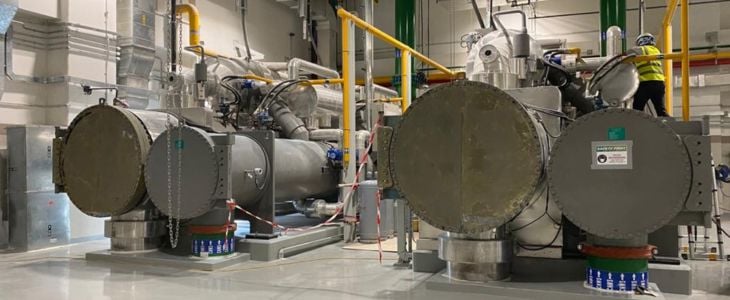The COP or coefficient of performance is a crucial measure to understand any heat engine’s energy efficiency. In a context where energy efficiency has become key for the development of projects, calculating and knowing the coefficient of performance of heat pumps has become a key metric.
This calculation derives from the working principle of heat pumps: these work by transferring heat energy from a source (which varies from the air, to the ground or water) into a working fluid, which is then in charge of delivering heat after being compressed. Nowadays, heat pumps stand at the center of decarbonization efforts in a number of areas, including their incorporation into highly-efficient district heating systems.
When it comes to considering their efficiency, the coefficient of performance of heat pumps can vary depending on many factors, such as:
-
Source temperature and temperature difference between the source and sink. The COP of a heat pump is higher when the temperature difference between the source and sink is small
-
Design quality of the plant and surrounding installations, such as the efficiency of the compressor
-
Choice of working fluid
As such, we’re going to look at the COP of heat pump formula, as well as some key values related to the most efficient industrial heat pumps today.
Coefficient of performance of heat pumps: a definition
The coefficient of performance (COP) of heat pumps measures this equipment’s efficiency in the transferring of heat from the source to the sink. As such, it provides a ratio that compares the amount of heat transferred to the amount of work that is needed to achieve that transfer.
In other words, the COP can be defined as the ratio of how much useful heat a heat pump can produce from a given energy input.
Mathematically, the COP of heat pump formula is given by the following equation: COP = Qh / W
Here:
-
Qh is the amount of heat transferred from the colder source to the warmer sink
-
W is the amount of work consumed to achieve that transfer.
For instance, a heat pump with a COP of 3.0 is able to transfer three units of heat from a colder source to a warmer sink for every unit of energy it consumes (which, in the case of modern heat pumps, tends to be electricity). As a result, it’s possible to infer that the higher the COP, the more efficient a heat pump is at transferring heat.
The SCOP or Seasonal COP
The SCOP or Seasonal Coefficient Of Performance represents another metric to measure a heat pump’s efficiency.
It’s been recently introduced in order to incorporate seasonal variables into the energy efficiency metric, so that it takes into account how well a heat pump works during the winter season (for heating) and summer season (for cooling) or, in other words, during a longer period of time.
The SCOP formula involves dividing the total heat output over the season by the total energy input (in kWh) to the system over the same period.
This is why some consider the SCOP to be more realistic about how a heat pump works in practice.
SCOP values are typically higher for geothermal and seawater heat pumps, which present relatively stable heat sources, compared to air-source heat pumps, which are subjected to variable outdoor temperatures.
Generally speaking, a SCOP of 2.5 or higher is considered to be an efficient year-round COP.

Why is it important to calculate the COP
Calculating the coefficient of performance of heat pumps is crucial to compare different equipment and their potential efficiencies. As heat pumps require the consumption of energy, a high COP can ensure high cost-optimizations are in fact achieved.
This importance is better understood in the wider framework of achieving energy efficiency and decarbonization. In a context in which operators are looking to implement sustainable, renewable heating solutions, heat pumps have taken center stage for their outstanding energy efficiencies.
Calculating the COP is thus the first step to choose the right heat pump for a project and replace carbon-emitting, obsolete systems. As such, projects can ensure they minimize the amount of resources they need to generate energy.
Among other benefits of incorporating heat pumps into energy projects are their capacities to include sustainable, local and non-fuel heat sources, including groundwater, seawater, and waste heat.
What is a good coefficient of performance of heat pumps?
As we’ve seen, there are different factors that can influence a heat pump’s efficiency, so that choices can be made to design the most efficient equipment.
All in all, and as a final note, a COP of above 3 for any heat pump is considered efficient.
However, there are typical values that indicate a good COP for the different types of heat pumps:
-
Air-source heat pumps can be considered efficient if they offer a COP starting at about 2.0
-
Geothermal heat pumps, because they offer smaller heat differences between source and sink, can go further, a good COP being values between 3.1 and 5.0. These values can vary depending on several design factors and operating conditions.
-
Seawater heat pumps use seawater as a source of heat, which is then transferred through the use of electrical energy input. COP values for this type of heat pump may vary depending on factors such as the size and type of the heat pump, or the design of its internal components, as well as actual operating conditions. However, because seawater presents a relatively stable temperature throughout the year, a well-designed seawater heat pump system can achieve a COP of 4.0 to 5.0 or even higher. For instance, an experiment by Petteri Aalto found that in a Finnish district heating installation using seawater heat pumps, total heating energy coverage was 77%, and heat pumps showed an average COP of between 4.6 and 2.8, depending on the season.
Want to learn more about the COP of heat pump formula and how to ensure you access the most suitable heat pump for your project? At Araner, we use our heating engineering to develop highly-efficient industrial heat pumps that are leading the way for decarbonization and energy efficiency in state-of-the-art district heating projects.
Get in touch with us and find out more about how we can help you.










